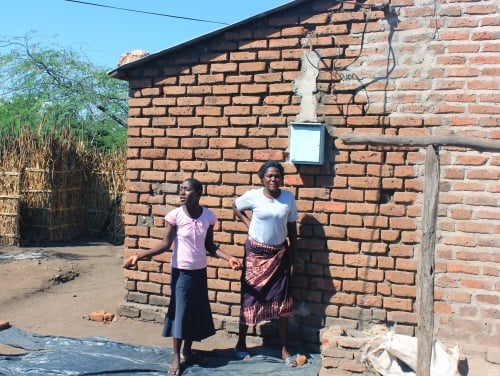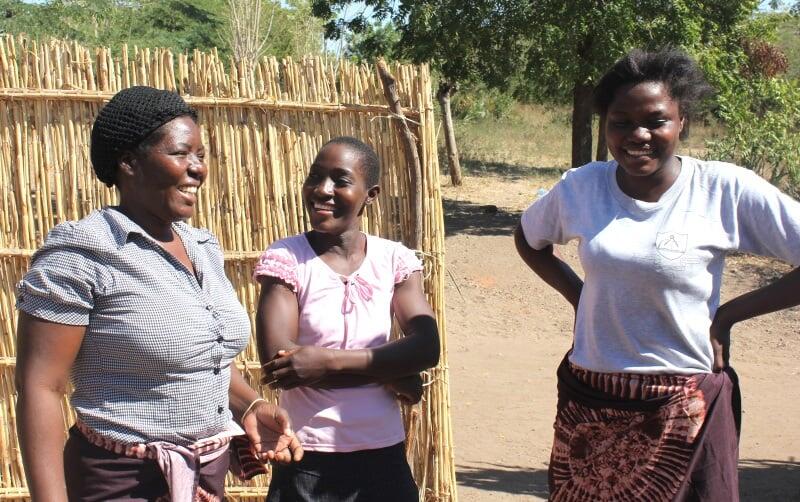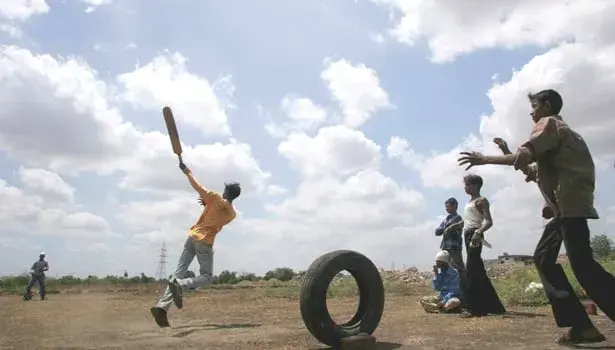JPAG provides hope for out-of-school girls
CHIKWAWA DISTRICT, Malawi – When Cecilia Changadeya, 19, fell pregnant while in grade seven and dropped out of school, she knew her ability to provide for her future family was in jeopardy. But never could she have dreamed of the opportunity that would present itself one day in the form of a skills programme that would help her light up homes.

Ms. Changadeya’s plight was echoed by that of Tisunge Sole, 22, who dropped out of school in 2009 when she fell pregnant while in form one. Because these young people were not able to return to school, they were selected for skills training for out-of-school youths provided to them by the UN Joint Programme for Adolescent Girls (JPAG) and Community Victims Support Unit (CVSU). The aim of JPAG is to empower them to generate finances in order to be self-sufficient.
These two young women, and others like them who have benefited from JPAG, received four months’ training in Chiradzulu district to learn electrical wiring. Today, their work is benefiting not only people living in their villages but those in surrounding villages too.
Green light for good wiring
Thanks to these young women, at least five houses in the community surrounding Konzere Primary School have been wired to connect to Malawian electricity supplier ESCOM. It is the mandate of ESCOM to check that the wiring in houses has been carried out properly and falls within their standards before they connect it to their grid in order to supply electricity.
Who can doubt them when ESCOM connected electricity to my house courtesy of their skills in wiring? – home owner, Chikhwawa
All five houses wired by Ms. Changadeya and Ms. Sole in this community have been certified by ESCOM as up to standard and are now receiving an electricity supply. The young women earn around $100 per house they wire up and use this money to support themselves and their children.
Ms. Changadeya is thrilled with her ability to support her family. “I feel very privileged to have been selected and enrolled on the skills development programme. I want to go further with my business by getting well established and reach out to other villages. Being a girl, I earn trust from my customers because they feel I cannot deceive them like some men who are in this industry.”
The owner of one of the houses where Ms. Changadeya and Ms. Sole installed the electrical wiring expressed her satisfaction with their work. “Who can doubt them when ESCOM connected electricity to my house courtesy of their skills in wiring?” she said.
I feel very privileged to have been selected for the skills development programme. I want to go further with my business by getting well established. – Cecilia Changadeya
Challenges faced by girls in Malawi
In Malawi, about half of all girls are married by age 18 and 25 per cent of all adolescent girls aged 15-19 years already have a child (UN Foundation, 2012).
Girls face a range of interrelated challenges – social, economic, protective and health – that limit their access to education. Data show that 58 per cent of girls drop out of school and of those remaining, 18 per cent became pregnant and 8 per cent marry (NSO, 2012). Less than 25 per cent of girls finish primary school.[1]
This low retention rate is largely attributed to harmful cultural practices and lack of age-appropriate reproductive health information and knowledge, self-efficacy and use of services. If services were made available, this could help reduce school drop-out through pregnancy prevention as well as reduce transmission of HIV and other STIs.
Sexual abuse in schools
Sexual abuse of girls in schools is another area of concern. In 2014, a survey on Violence Against Children by the Malawi Ministry of Gender, Children and Social Welfare found that more than one in five girls experience sexual abuse before the age of 18 years and half of these before the age of 13. A third of all 13-17 year olds who had experienced sexual abuse reported that the abuser was a class mate or fellow pupil; between 10-20 per cent of all sexual abuse incidents reported occurred at school.
Student and teacher attendance at school is negatively affected by poverty and economic hardship.
Without a comprehensive approach that addresses the main threats – poor food and nutrition, inadequate protection, poor quality schooling, violation of girls’ sexual and reproductive rights – girls may avoid one threat only to succumb to another.
These girls’ lives will never be the same again. – Jean Mwandira, UNFPA SRH specialist
JPAG empowers girls
JPAG was launched in 2010 with start-up funds from the UN Foundation and has been implemented in two districts – in the two Traditional Authorities of Masache (Chikhwawa) and Katuli (Mangochi) in the southern region of Malawi. Since 2011, the project has been funded by the Royal Norwegian Embassy. Initially, the participating agencies included UNFPA, UNICEF, WHO and UNESCO; today, UNFPA is the administrative agent.
As a result of the initiative more girls are participating in girls-only clubs and community development activities, and are taking leadership roles in these clubs. Around 200 adolescent girls have been trained in skills development in the two TAs. Some of them have since established small businesses and are making a living from them.
The programme has increased school enrolment and retention in both districts: 74 per cent of the girls are now attending school compared to 53 per cent previously. School drop-out rates have declined from 93 per cent to 35 per cent, while fewer adolescents report dropping out of school at the final evaluation due to difficulty paying school fees.
Literacy levels have improved too and are now at 74 per cent in Mangochi and 47 per cent in Chikhwawa. This is attributed to free basic education and the number of young married adolescents returning to school. In the programme areas, there is increased knowledge of the importance of girls’ education among girls and in their communities.
The programme also showed improved school performance among the beneficiaries – a pass rate of 100 per cent for girls who sat the Junior Certificate of Education in the 2013-2014 academic year compared to a pass rate of 67 per cent for MSCE.
Training leads to bigger dreams
Ms. Changadeya and Ms. Sole are just two of the young women who have benefited from the JPAG skills programme for out-of-school youths in this community. In addition to providing electrical skills, the programme offers training in baking and tailoring.
“These girls’ lives will never be the same again,” said Jean Mwandira, UNFPA Sexual and Reproductive Health specialist. “They now have skills to generate money and support themselves.”
Thrilled with the success of their new skills, Ms. Changadeya and Ms. Sole are now looking beyond their own villages. Their vision is to carry out their work in a small town and earn more money to support their families – a dream that just a year ago, without the JPAG intervention, they could never have contemplated.
Ms. Sole described how the programme has given her hope: “With the money I make from this work, I am able to support myself and my child. I do not need money from any man to buy my basic needs, like other girls in my community. I feel empowered.”
By Henry Chimbali
[1] Education Management Statistics System: Education statistics , 2013 bulletin





